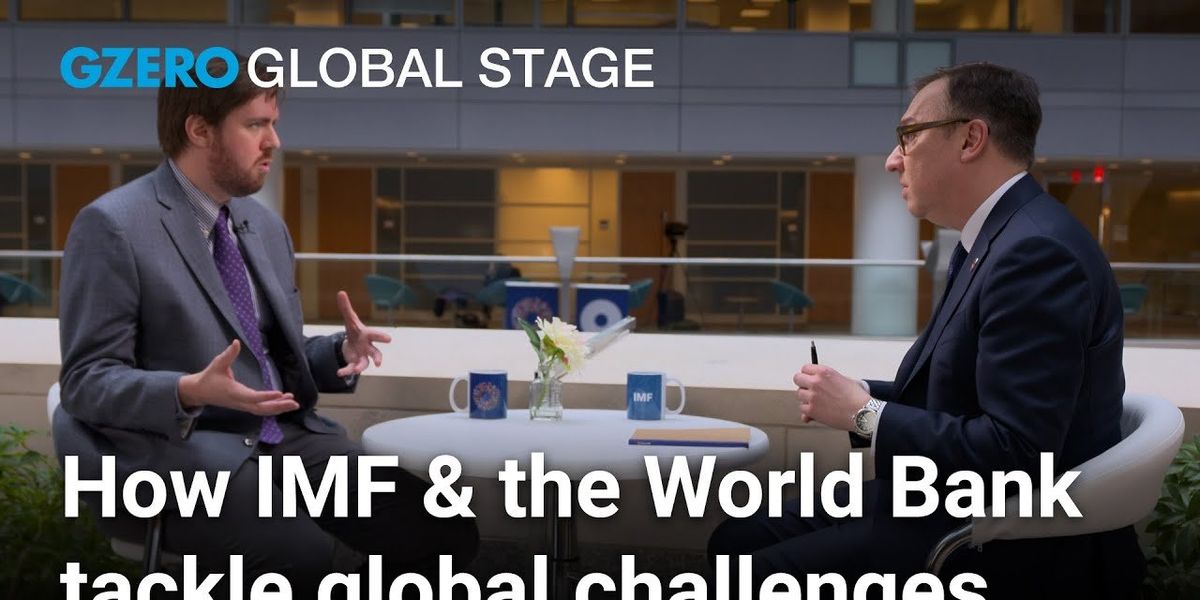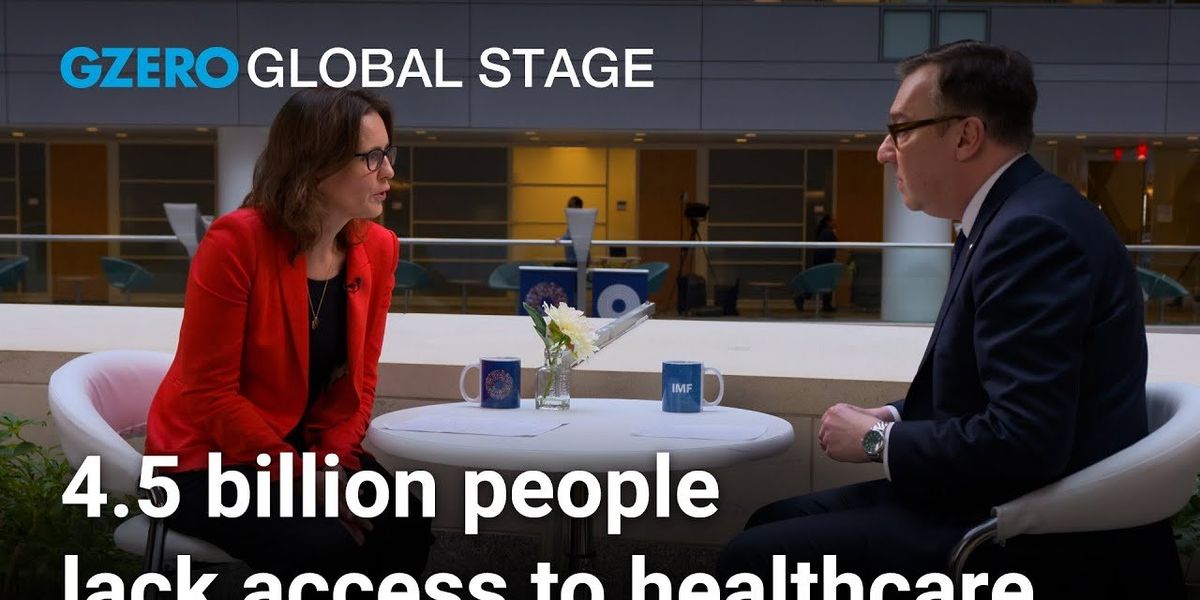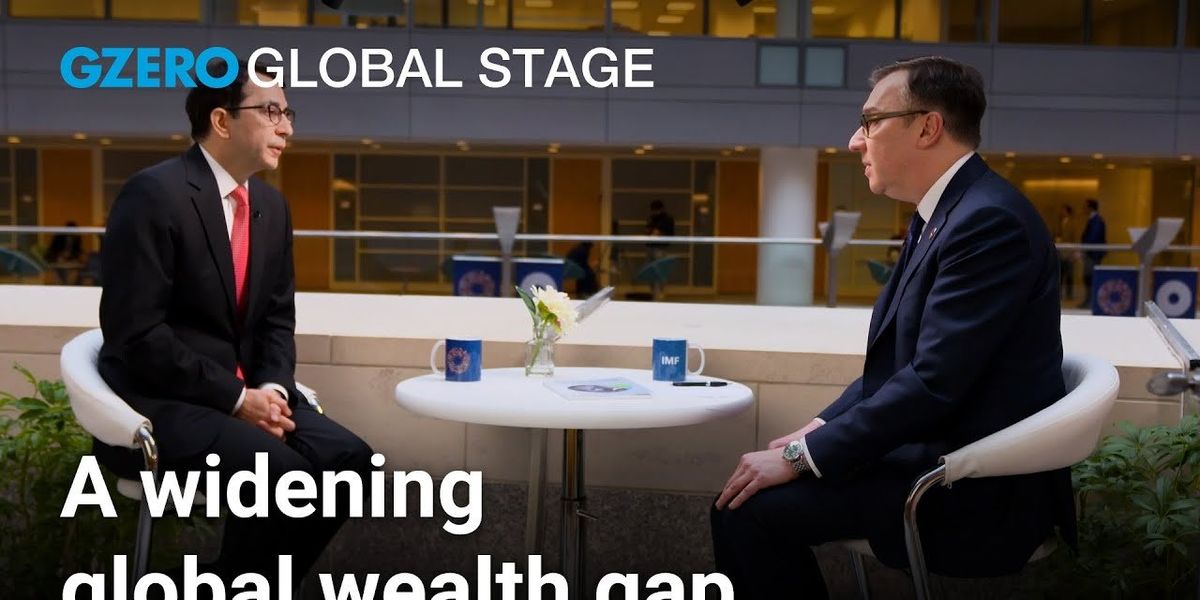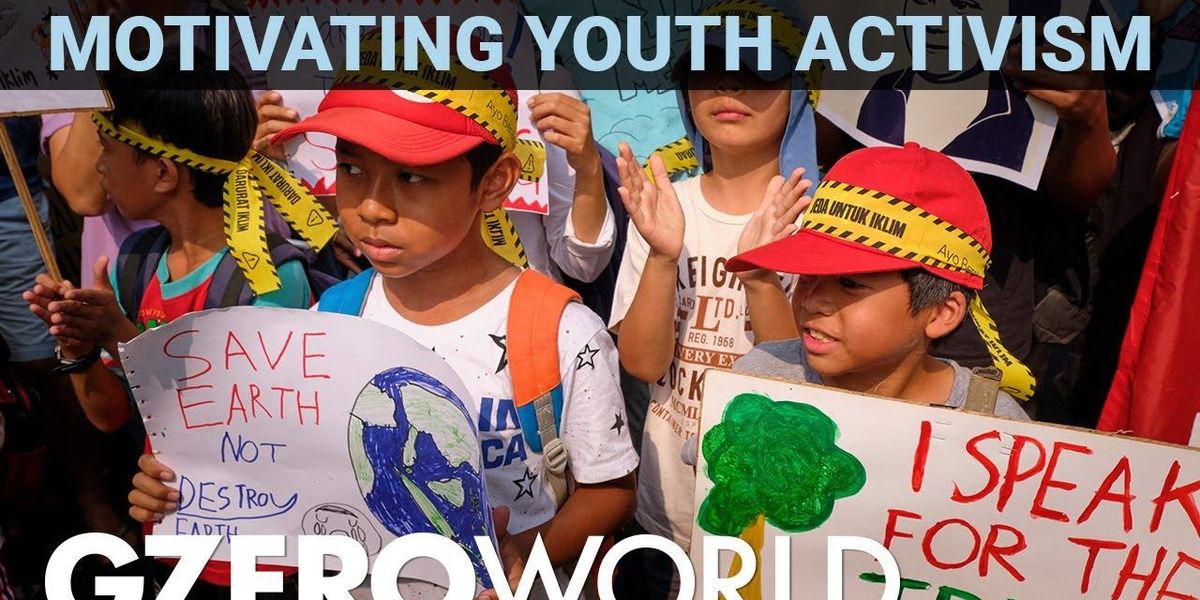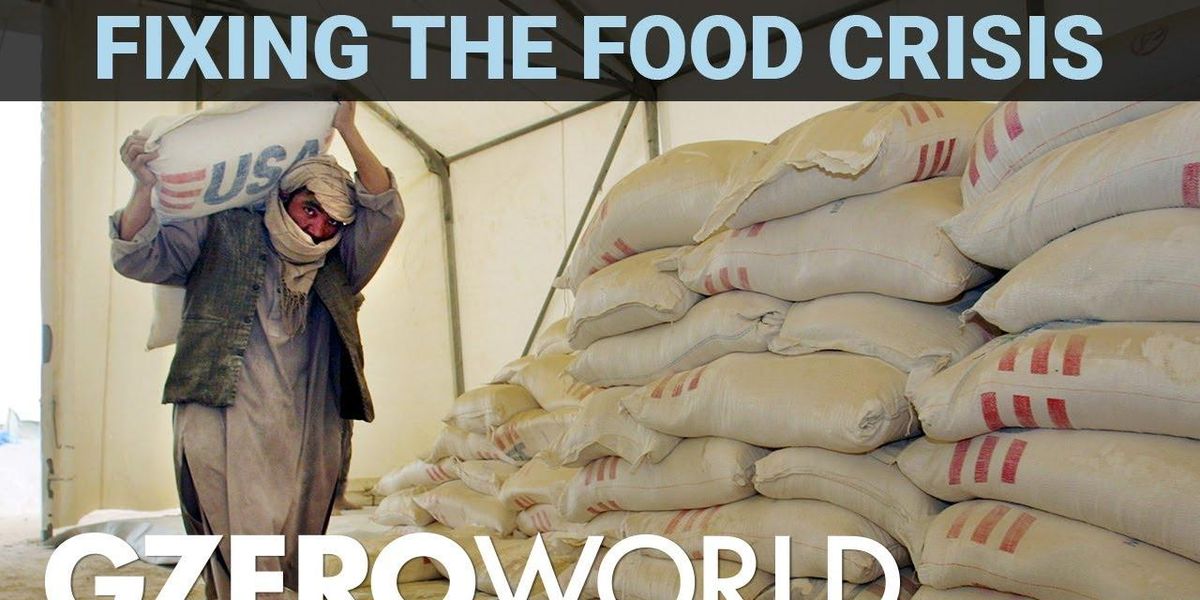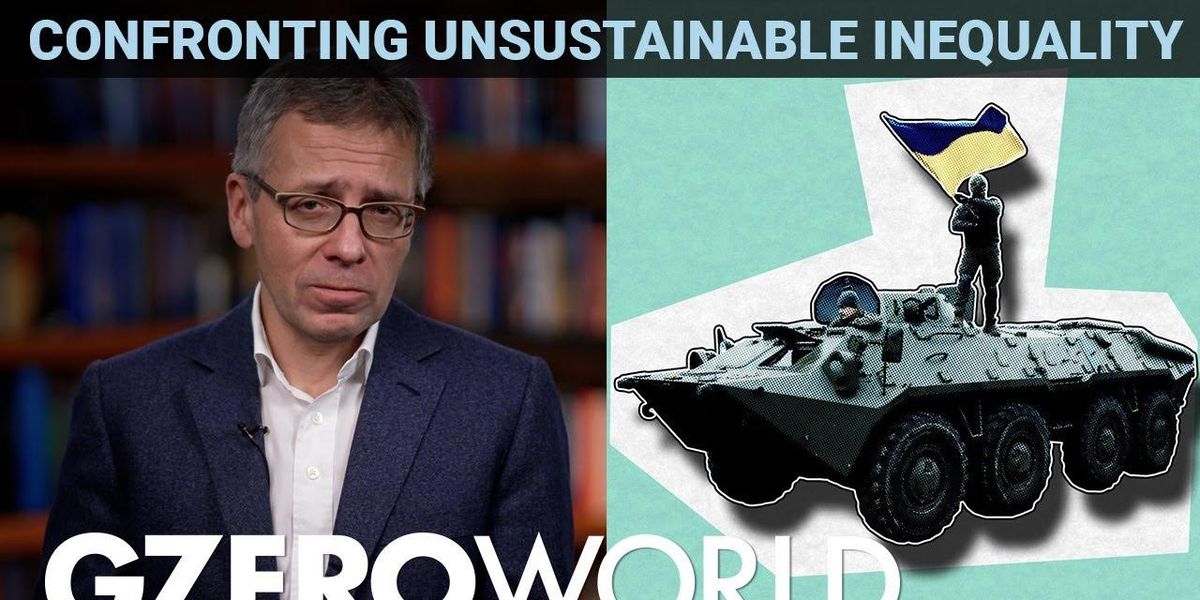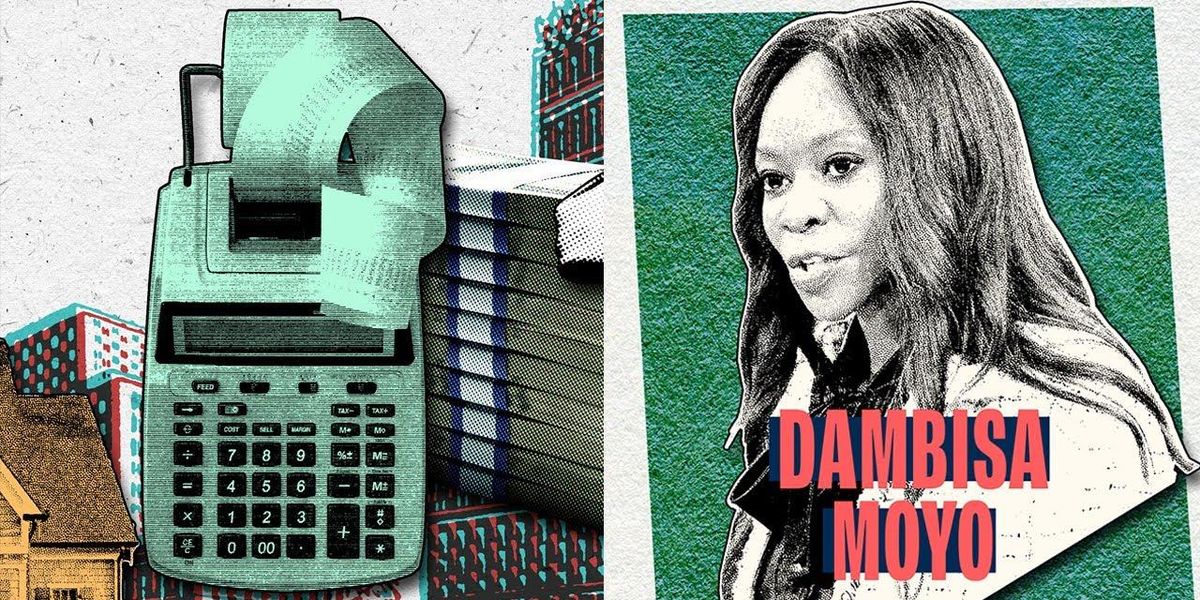Trending Now
We have updated our Privacy Policy and Terms of Use for Eurasia Group and its affiliates, including GZERO Media, to clarify the types of data we collect, how we collect it, how we use data and with whom we share data. By using our website you consent to our Terms and Conditions and Privacy Policy, including the transfer of your personal data to the United States from your country of residence, and our use of cookies described in our Cookie Policy.
{{ subpage.title }}
How to tackle global challenges: The IMF & World Bank blueprint
The International Monetary Fund and World Bank’s Spring Meetings in Washington have told a tale of two economies: In the developed world, inflation is falling, and recession looks unlikely. But many of the world’s poorest countries are struggling under tremendous debt burdens inflated by rising interest rates that threaten to undo decades of development progress. That means these key lenders of last resort have their work cut out for them.
The good news? There’s a proven model, as GZERO Senior Writer Matthew Kendrick discussed with Tony Maciulis at a Global Stage event while reporting on the meetings. Somalia, once the byword for a failed state, managed to implement massive reforms to its financial system to meet the guidelines of the IMF’s Highly Indebted Poor Countries Initiative.
“Because they met those guidelines — while still in a very fragile environment where they were fighting Islamic extremists in the country, dealing with semi-autonomous zones in the north — they managed to discharge 90% of their debt,” said Kendrick. “It's proof that even in very fragile countries, if, as the Somali finance minister said yesterday, you build these projects into nationally unifying efforts to build a better future, they can have tremendous success.”
Kendrick also cited comments from experts calling for the IMF and World Bank to change how they view humanitarian work more generally and not back away from countries amid war. “Conflicts are becoming a day-to-day part of our lives all over the world,” he says. “That means that the IMF and World Bank, in order to make progress on development, have to figure out ways to work with the institutions in these countries as they are also in conflict.”
For more of our 2024 IMF/World Bank Spring Meetings coverage, visit Glogal Stage.
- IMF says economic picture is rosy, but how does it look from the bottom? ›
- Debt limits of rich countries hurt poor countries' growth, says World Bank's Malpass ›
- What We're Watching: Nigerians vote, Biden's World Bank pick ›
- World Bank economist: The poorest are getting poorer globally ›
- With electric bills soaring, should the EU cap natural gas prices? ›
- Why Africa's power partnership with the World Bank should attract investors - GZERO Media ›
World Bank announces plan to bring power to 300 million in Africa
World Bank Group is bringing power to the people. Literally.
This week, during the bank’s annual Spring Meetings, the group announced a major new initiative to provide electricity to 300 million Africans by 2030. It is estimated that nearly 800 million people globally lack access to power, and the vast majority of them, 600 million, live on the African continent.
GZERO’s Tony Maciulis met with the World Bank’s Director of Infrastructure for West Africa Franz Drees-Gross, to discuss the project's details.
Over the next six years, the World Bank aims to connect 250 million people using $30 billion of public sector funding largely drawn from its International Development Association. The development finance institution provides low-interest loans and grants to the poorest countries. The group has also partnered with the African Development Bank, which has committed to supporting an additional 50 million people.
The connectivity will come from a combination of sources, some existing and some to be created by the project.
“It turns out that the most cost-effective way to connect those 250 million people is to connect about half of them using off-grid solutions,” Drees-Gross said. “So that means solar home systems, it means mini-grids that aren't connected to the larger national grid, and the other half of that goal will have to be connected by grid extensions and grid densifications.”
The ambitious plan comes with challenges including fortifying and modernizing existing utility companies to be able to consistently provide power and collect customer payments.
“The problem in many Sub-Saharan African countries is that utilities aren't recovering their costs,” Drees-Gross said. “They lose 30, 40, sometimes 50% of electricity due to commercial and technical losses. Since they only invoice a fraction of what they buy from the generators and then fail to collect that entire amount, that leads to a deficit.”
That inconsistent business has made the utilities less attractive to private-sector investors. World Bank hopes its support in stabilizing the power industry in the region will be an opportunity that will bring in private investment, ultimately powering the growth of more economies in Africa.
For more of our 2024 IMF/World Bank Spring Meetings coverage, visit Glogal Stage.
Half the world can’t access healthcare. How can the World Bank help?
Globally, a shocking 4.5 billion people — more than half the world’s population — lack access to essential healthcare and another 2 billion have to make tough financial choices to find care. That means for the majority of people on earth when a child is sick, families can’t get medicine; when a mother gives birth, the delivery is unsafe; when people develop chronic conditions, they go untreated.
Billions of individual tragedies come together to hold back development in some of the world's most fragile countries, and that’s where the World Bank has a role to play. Monique Vledder runs the Global Health Practice at the World Bank, and she sat down with GZERO’s Tony Maciulis at a Global Stage event for the institution’s annual Spring Meetings.
She announced ambitious goals to start tackling the problem: “We are planning to reach, with our financing and our programs, 1.5 billion people over the next five years with quality health services,” she says, expanding the World Bank’s geographic footprint in healthcare to target vulnerable countries and build capacity in their healthcare systems.
For more of our 2024 IMF/World Bank Spring Meetings coverage, visit Glogal Stage.
- Advancing racial equality and economic opportunity ›
- Get AI out of my health care ›
- Slapping nutrition labels on AI for your health ›
- Hard Numbers: Grim warnings on climate change, Rich get richer, Gender healthcare gap, AI dominates the conversation ›
- Hot topics at the IMF-World Bank meetings - GZERO Media ›
World Bank economist: The poorest are getting poorer globally
It’s a staggering statistic and a marked setback from the years before the COVID-19 pandemic—the world’s poorest countries are falling further behind, and the wealth gap between the least and most developed nations is growing. One in three of these countries is poorer today than in 2019.
Ayhan Kose, World Bank Group’s Deputy Chief Economist, said that the combined shocks of multiple crises, including the pandemic, wars in Ukraine and the Middle East, food insecurity, and inflation, have taken a massive toll on the 75 least developed economies.
Kose spoke to GZERO’s Tony Maciulis as the annual Spring Meetings of the World Bank and the International Monetary Fund were underway this week in Washington, DC.
“When the food price goes up, the price of oil goes up. That has significant implications for these economies,” he told GZERO. “Where we are now, when you look at 2020-24, they registered the weakest growth rate on average since the 1990s.”
In many ways, the global economic outlook presented this week tells a tale of two post-pandemic realities. Kose explained that the most developed nations, particularly the US, showed greater resilience than expected early in 2023, and the threat of recession has been kept at bay. However, the negative impacts on poor countries, many of which are in Sub-Saharan Africa, cannot be ignored and could lead to greater geopolitical risk and humanitarian emergencies.
This week, World Bank leaders are calling for a renewed commitment to the International Development Association (IDA), which provides zero-interest loans and grants to nations most in need. Kose said the risk associated with crippling sovereign debt has caused some private sector funding to dry up and that politics and protectionism are impacting how wealthier nations approach funding.
But he also pointed to enormous opportunity in nations that are IDA-funded, including a younger population that could serve as a future global workforce and rich natural resources.
With proper investment and funding, he explained, other developing countries have been lifted to find sustained growth.
“At the end of the day history is full of examples. China, India, Indonesia, Chile, (South) Korea. They all used to be IDA borrowers. They were poorer countries. They became much richer.”
For more of our 2024 IMF/World Bank Spring Meetings coverage, visit Glogal Stage.
- What We're Watching: Nigerians vote, Biden's World Bank pick ›
- What We’re Watching: Terror in Kyiv, World Bank/IMF meetings ›
- Podcast: Fix the global debt crisis before it's too late, warns World Bank's David Malpass ›
- Debt limits of rich countries hurt poor countries' growth, says World Bank's Malpass ›
- World Bank's David Malpass on global debt & economic inequality ›
- How to tackle global challenges: The IMF & World Bank blueprint - GZERO Media ›
How to save our future from the crises we create
Who has the most at stake in making the world a better place? Young people.
After all, the decisions we make today affect their future more than any other age group.
“Not just the young people who make up half of the world's population today, but the 11 billion people who are yet to be born by the end of this century," asks UN Foundation President Elizabeth Cousens, "what are we leaving to them?”
In a GZERO World interview with Ian Bremmer, Cousens offers some thought on what the youth can do for global development based her experience working with young people.
Watch the GZERO World episode: Inequality isn't inevitable - if global communities cooperate
Food emergency: what to do when people are hungry now
On global issues, the international community must walk and chew gum at the same time. It needs to learn to deal with simultaneous crises that play off each other, says UN Foundation President Elizabeth Cousens.
That's why we dropped the ball on hunger.
Now the needs are huge and growing. We haven't seen a lot of images of starvation yet, but they are coming, Cousens tells Ian Bremmer on GZERO World.
"We have to be able to rise to this challenge, and see it as something that's in both our interest," she says, adding that “we have done heroic things before on the humanitarian front — it's not like we're not collectively capable."
Watch the GZERO World episode: Inequality isn't inevitable - if global communities cooperate
Our unsustainably unequal world
The past is still very much with us.
It's almost the first anniversary of Russia's war in Ukraine. On March 11, it'll be three years since the World Health Organization declared COVID-19 a pandemic. And 2022 was the sixth warmest year on record since ... 1880.
We are still dealing with the fallout from all three events. But not equally.
Since 2020, the richest 1% of people has accumulated nearly two-thirds of all the new wealth created in the world. Just 10% of the population owns three-quarters of global wealth — and account for nearly half of carbon emissions.
What can we do to turn this around?
Watch the GZERO World episode: Inequality isn't inevitable - if global communities cooperate
Global economy headed to a recession
Most of the global economy is more likely than not headed toward a recession in 2023. But don't only blame it on inflation and Russia's war in Ukraine.
The economic slowdown this year "is an acceleration of already structural problems around growth, that really started before the pandemic," renowned global economist, Dambisa Moyo tells Ian Bremmer on GZERO World.
Moyo says global inflation is not going anywhere, as the likelihood of a worldwide recession looms large.
Although most of the world understands that they need to transition to cleaner energy, in the short term they still rely on “a hundred million barrels of oil every day.” Europe is creating what Moyo calls, an “industrial Band-Aid solution,” rather than long term solutions to rely on energy from other countries. They discuss how these combined threats will affect the world economy this year.
This interview was featured in a GZERO World episode: "Struggling for economic progress as global recession looms in 2023" on January 9, 2023.
- The unintended effect of US-China economic breakup ›
- Dambisa Moyo: Europe's energy transition needs more than a "band-aid solution" ›
- Struggling for economic progress as global recession looms in 2023 ›
- Podcast: China's economic head start & a world accelerating into recession ›
- The global economy: good news and bad news from economist Dambisa Moyo - GZERO Media ›
